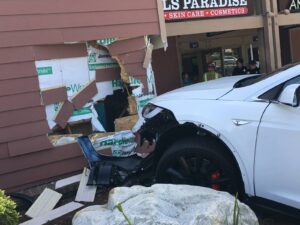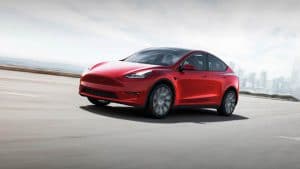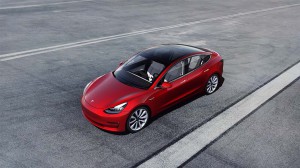
Having initiated an investigation into complaints of sudden acceleration in Teslas a year ago, the National Highway Traffic Safety Administration closed that query last week after absolving the California-based EV maker of blame.
NHTSA’s inquiry found that 246 crashes involving Teslas came as a result of drivers confusing the accelerator and brake pedal, aka pedal misapplication, and not from any manufacturing defect.
The analysis came as a result of a petition, filed Dec. 19, 2019 by independent investor Brian Sparks, alleging, “Tesla vehicles have a structural flaw which puts their drivers and the public at risk. I further believe Tesla must know of this flaw and be unresponsive to it.”
(Tesla chief Musk now world’s wealthiest person due to record-setting stock price.)
Sparks’ complaint involved 2012-2020 Tesla Model S, Model X, Model 3 and Model Y vehicles crashing through walls of restaurants, banks, garage doors and other stationary objects. NHTSA closed its investigation, noting, “the theory provided of a potential electronic cause of SUA (sudden unintended acceleration) in the subject vehicles is based upon inaccurate assumptions about system design and log data.”

The report goes on to state that, “there is no evidence of any fault in the accelerator pedal assemblies, motor control systems, or brake systems that has contributed to any of the cited incidents. There is no evidence of a design factor contributing to increased likelihood of pedal misapplication.”
Tesla, in response to the petition nearly a year ago, stated that, “this petition is completely false and was brought by a Tesla short-seller. We investigate every single incident where the driver alleges to us that their vehicle accelerated contrary to their input.”
(Tesla narrowly 500K delivery target for 2020.)
But Tesla has a combative history with safety regulators, and not merely for its automated driving system.
In November, NHTSA expanded their probe into flash memory failure on Tesla touchscreens, which would cause the car to lose many functions, including the rear backup camera, a federally mandated safety feature, on 2012-18 Model S and 2016-18 Model X vehicles.

That same month, the agency launched a formal inquiry into front suspension failure on 2015-2017 Model S and 2016-2017 Model X vehicles.
And in July, the Los Angeles Times reported that NHTSA is investigating the 2012-2016 Model S’s battery packs for cooling system problems that could render the batteries useless, or cause them to catch fire. This, and the growing chorus of quality complaints concerning the Model Y, seems to suggest that Tesla hasn’t fully conquered its manufacturing gremlins.
(Tesla’s Musk offering big incentive to drum up end-of-year sales: free FSD.)
Yet none of this seems to have affected Tesla’s stock price, which is hovering near 52-week highs; nor its sales, which amounted to 499,550 vehicles in 2020, or chief executive Elon Musk’s net worth, which was estimated last week at $185 billion, making Musk the richest man in the world, just ahead of Amazon’s Jeff Bezos.







